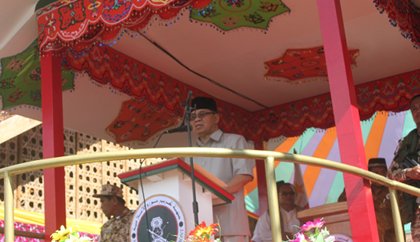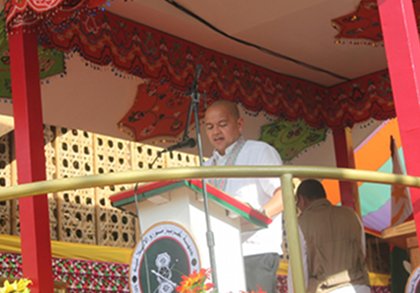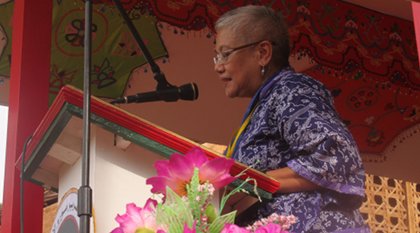SUMMARY
This is AI generated summarization, which may have errors. For context, always refer to the full article.
 Even as the peace process between the Philippine government and the Moro Islamic Liberation Front (MILF) currently suffers uncertainties after failing to reach a consensus during their last exploratory talks in May 2012, both parties remain committed to sign a peace agreement in order to provide political answer to the Bangsamoro question.
Even as the peace process between the Philippine government and the Moro Islamic Liberation Front (MILF) currently suffers uncertainties after failing to reach a consensus during their last exploratory talks in May 2012, both parties remain committed to sign a peace agreement in order to provide political answer to the Bangsamoro question.
The opening day of the Bangsamoro Leaders Assembly (BLA) on July 7, Saturday, stressed the urgent need for both parties to go back to the negotiating table in order to end the internal armed conflict on the Moro front and promote peace and development in Mindanao.
In his “State of the Bangsamoro Struggle Address,” Al Haj Murad Ebrahim, chairman of the MILF Central Committee, candidly expressed regrets that “negotiation with the Philippine government is moving in snail-pace.” Murad claimed that up to now, “many substantive issues remain unresolved.”

Murad lamented that the Philippine government was seemingly “not inclined to resolve the armed conflict,” but only to manage it so that “it can continuously rule the Bangsamoro people and exploit the resources of the Bangsamoro homeland.”
He hoped, however, that President Benigno Aquino III would make a difference.

Marivic Leonen, chairman of the panel for talks with the MILF, shared the view of Murad to move fast on the negotiation. He even challenged the MILF to sign the peace agreement this year “so there is an opportunity to implement and assess it”.
Leonen, however, gave a strong caveat. The agreement, he argued, must be “simple” and “meaningful” alluding to the complexity and comprehensiveness of the Draft Comprehensive Compact submitted by the MILF to the government.

Presidential Adviser on the Peace Process Teresita Deles was emotional, as usual, when she underscored in her speech the sincerity of President Aquino III to really sign a peace agreement with the MILF.
Deles said that the President’s meeting with Chairman Murad in Japan in August 2011, and his rejection of the call for an “all-out-war” against the MILF at the height of the Al-Barka incident in October 2011, were strong symbols of the government’s ardent commitment to find a peaceful solution to the armed conflicts in Mindanao.
Deles, with her long experiences in civil society movements, knew how to handle the huge crowds during the assembly when she exclaimed that the time for peace in Mindanao is now! The crowd responded with “Allahu Akbar”!
Still divided on key issues
While speeches could raise hopes and optimisms, realities on the ground could tell another stories.
At present, the MILF peace panels remain divided over many substantive issues of the peace negotiations.
In their last meeting in May 2012, both panels failed to reach a consensus on the issue of “transition.” Agreeing on this issue was essential for the successful implementation of any peace agreement. Both parties planned to have another exploratory talks before the end of this month.
The issue of the “police power” of the “Bangsamoro State Government” (BSG) has not been discussed. While the MILF already agreed to give the responsibility of national defense and foreign policy to the national government, the MILF wanted internal policing to be given to the BSG.
Both panels are also still debating on the details of “power-sharing”, “wealth-sharing”, “revenue generation”, and “resource exploitation”.
More importantly, both panels continue to have different perspectives and understandings of the constitutional implications of a peace agreement.
Given these realities, it is very unrealistic to sign a peace agreement this year.
If, by miracle, a peace agreement is signed this year, it will be a watered-down version of the original MILF proposal.
This kind of agreement will offer the Bangsamoro people a glass that is only half-full and half-empty — a hard situation that can make peace and development in Mindanao more challenging to pursue. – Rappler.com; Photos from the Philippine Institute for Peace, Violence and Terrorism Research
Rommel C. Banlaoi is the Executive Director of the Philippine Institute for Peace, Violence and Terrorism Research (PIPVTR) and author of a terrorism research trilogy: Philippine Security in the Age of Terror (2010), Counter-Terrorism Measures in Southeast Asia (2009) and War on Terrorism in Southeast Asia (2004).
Add a comment
How does this make you feel?
There are no comments yet. Add your comment to start the conversation.